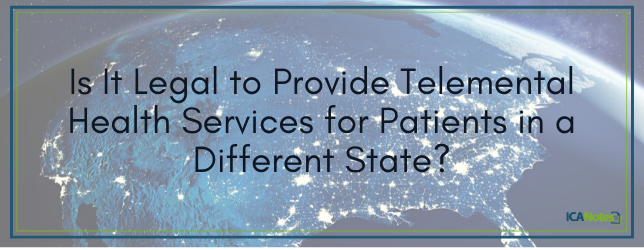Is It Legal to Provide Telemental Health Services for Patients in a Different State?

Telehealth is a growing field driven by improvements in communications technology and a need for health care in historically under-served areas. Telehealth is especially promising for behavioral health services and affords practitioners an excellent way to expand their practices. However, one question is creating a good deal of confusion for behavioral health specialists: Can you provide telebehavioral health care to patients who reside in other states? We’ll break down what you need to know about this crucial question.
Table of Contents
- About Telemental Health Services
- Federal and State Telemental Health Service Regulations
- The Importance of State Licensing Boards and Their Regulations
- Differences in Telebehavioral Health Licensing Across States
- Interstate Medical Licensure Compact
- Cross-State Telemental Health Practice Regulations
- How to Ensure That Your Practice Follows Cross-State Telehealth Laws
About Telemental Health Services
The term “telemental health services” refers to behavioral health services performed through telemedicine or telehealth. Telehealth involves the use of electronic communication to provide care remotely. Every state counts different types of applications as telehealth services, including videoconferencing, file transfer and remote monitoring. In telemental health, a practitioner uses these practices to provide behavioral health care. Many telemental health services focus on videoconferencing and record transfer for therapy, diagnosis and prescribing.
Telehealth services like telemental health have seen increasing acceptance in the United States, but laws vary across the country. The legal requirements for telehealth differ by state, and cross-state telemedicine involves recognizing two states’ regulations. Practitioners can provide telemental health care across states legally in specific situations. Understanding these laws will help you provide better care to your patients while staying compliant.
Free Ebook: Going Virtual
Everything you need to start a virtual behavioral health practice.

Federal and State Telemental Health Service Regulations
On the federal level, there are no regulations that address the requirements for providing behavioral health services to patients who reside in other states. Currently, Congress is considering the Mental Health Telemedicine Expansion Act, which would allow all Medicare beneficiaries to receive telebehavioral health care at home, no matter where they live.
While important in expanding access to behavioral health care, this package of bills does not create any federal guidelines for practicing across state lines. These telehealth laws are still administered by states on an individual basis.
The Importance of State Licensing Boards and Their Regulations
The role of state licensing boards is first and foremost to protect the state’s public. Every state has its own licensing board, which has jurisdiction whenever a client is physically present in the state. This means a clinician would need to follow two different state licensing boards’ regulations in order to treat a patient who is currently located in a different state.
Differences in Telebehavioral Health Licensing Across States
Telehealth laws regarding licensing vary significantly. For example, one state may allow out-of-state practitioners to obtain a temporary license with relative ease, while another requires full licensure without any way to expedite the process.
Some states have reciprocity agreements between their licensing boards, which allow providers to practice in the other state. For example, Kentucky and Tennessee have a reciprocity agreement based on the acknowledgment that the Licensed Professional Clinical Counselor (LPCC) license issued in Kentucky is substantially equivalent to the Licensed Professional Counselor with Mental Health Service Provider designation (LPC/MHSP) license issued by Tennessee.
Agreements of this nature can make obtaining a license in another state significantly easier, but the only way to find out which states have such programs is to check with individual licensing boards.
Interstate Medical Licensure Compact
The Interstate Medical Licensure Compact (IMLC) is a program that allows qualified clinicians to practice in multiple states by obtaining a voluntary, expedited license. Licensed practitioners can qualify as long as they meet a set of agreed-upon eligibility requirements, which about 80% of applicants do. Currently, 29 states, D.C. and the Territory of Guam have joined the IMLC agreement.
Cross-State Telemental Health Practice Regulations
Behavioral health clinicians must consider that with 50 different states come 50 different sets of telemental health services regulations. However, there is one large piece of common ground. In 49 states and the District of Columbia, providers must be licensed in the state where the patient is located.
To make this easier, 12 states issue special licenses or certificates that allow clinicians to practice telemedicine. Six states require providers to register with the state licensing board in order to practice across state lines.
How to Ensure That Your Practice Follows Cross-State Telehealth Laws
The safest way to perform cross-state telemental healthcare is to obtain a license in the state where your patient is located. However, if the other state doesn’t have a reciprocity agreement with your state and doesn’t participate in the IMLC, that can be extremely time-consuming and may not be worth it for a single patient. The next best thing is to check the state’s temporary practice rules.
Contact the state’s licensing board and confirm whether they have any temporary practice rules. Be sure to obtain documentation of the answer, preferably by email so you have the rules in writing.
There may be some confusing language in the rules that needs clarification. For instance, if the state offers a 30-day temporary license, you need to know whether those days must be consecutive or not. The difference can result in only being able to treat a patient once or twice with a consecutive 30-day license and being able to schedule 30 appointments total with a non-consecutive license. It’s a good idea to consult your national professional association as well as your legal counsel for advice.
ICANotes Behavioral Health Services EHR for Telehealth
There’s no simple answer to the question of whether it’s legal to provide telemental health services for patients in a different state. In many cases, it is a viable option, but you must perform your due diligence in looking up reciprocity agreements or IMLC participation. When you find that it is legal to provide cross-state services, one of the best things you can do to protect your practice is to ensure your EHR is robust enough to meet documentation and interoperability needs.
ICANotes is designed by behavioral health clinicians for behavioral health clinicians. If you’re thinking about cross-state practice, these features are essential to doing so legally:
- Accurate charting: Clean documentation is even more essential for practicing across state lines. ICANotes makes charting easy and accurate.
- HIPAA compliance: HIPAA applies everywhere, so having a compliant EHR system is necessary no matter where you practice.
- Integrations: Different clearinghouses, labs and health information exchanges operate in different regions. An EHR with extensive integrations helps ensure interoperability when you’re practicing in other states.
Ready to learn more about how ICANotes can make cross-state telemental health care easier? Schedule a live demo or try out our software yourself by requesting a free trial.
Related Posts
Are Mental Health Record Guidelines the Same for Every State?
How Behavioral Health Clinicians Can Avoid a Lawsuit
Will Insurance Companies Pay for Video & Phone Therapy Sessions?
